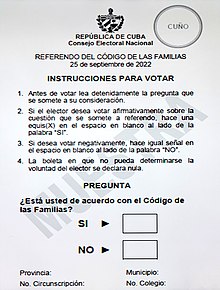
2022 Cuban Family Code referendum

| ||||||||||||||||||||||
Do you agree with the Family Code? | ||||||||||||||||||||||
 | ||||||||||||||||||||||
| Results | ||||||||||||||||||||||
|---|---|---|---|---|---|---|---|---|---|---|---|---|---|---|---|---|---|---|---|---|---|---|
| ||||||||||||||||||||||
 Results by province | ||||||||||||||||||||||
 |
|---|
|
|
A referendum was held on 25 September 2022 in Cuba to approve amendments to the Family Code of the Cuban Constitution.[1] The referendum passed, greatly strengthening gender equality, legalizing same-sex marriage, same-sex adoption, and altruistic surrogacy, and affirming a wide range of rights and protections for women, children, the elderly and people with disabilities.[2][3] Following the referendum, Cuba's family policies have been described as among the most progressive in Latin America.[4]

Background
Until 2019, Article 36 of the Constitution of Cuba (most recently amended in 1992) defined marriage as "the voluntary union established between a man and a woman". As such, the wording constitutionally prohibited same-sex marriage.[5]

In December 2017, LGBT groups launched a public campaign to repeal the constitutional ban.[6] On 4 May 2018, Mariela Castro said that she would propose a reform of the constitution and introduce a complementary measure to legalize same-sex marriage, since the constitutional reform process was expected to begin in July 2018.[7][8] On 21 July, the Council of State, Homero Acosta Álvarez, said that the draft constitution included a provision that defined marriage as a "union between two people".[9][10] The National Assembly approved the draft on 22 July,[11][12][13][14] and it was subject to public consultation between 13 August and 15 November 2018.

The issue of same-sex marriage triggered public debate and organization in Cuba. In June 2018, five Christian denominations declared same-sex marriage "contrary to the spirit of the communist revolution".[15] In what was described as "a poster war", both opponents and supporters of same-sex marriage put up hundreds of posters around Havana.[16] In September 2018, after conservative opposition to the proposal to legalize same-sex marriage, President of Cuba and First Secretary of the Communist Party of Cuba, Miguel Díaz-Canel, announced his support for same-sex marriage. In his first interview since taking office in April, he told Telesur that he supports "marriage between people without any restrictions", and is in favor of "eliminating any kind of discrimination in society".[17][18]

Pressure from religious fundamentalist groups and deep-rooted conservatism in Cuban society were factors in defining marriage with vaguer wording instead of "a union between two people".[19] In December 2018, the final draft of the new constitution was ratified by the National Assembly and defined marriage as a "social and legal institution" without reference to the gender of the parties. This meant that the new constitution would not explicitly legalize same-sex marriage, but at the same time the ban on same-sex marriage would be repealed.[20][21] Mariela Castro said that same-sex marriage would instead be legalized through a change in the Family Code.

The new constitution was approved in a referendum on 24 February 2019, with 90.6% in favor, and entered into force on 10 April of the same year.[22][23] Article 82 of the new constitution states:

Marriage is a social and legal institution. It is one of the forms of family organization. It is based on the free consent and the equality of rights, obligations and legal capacity of the spouses. The law determines the form in which it is constituted and its effects.[24]
Preparations

On 15 September 2021, the Cuban government published the draft of the new Family Code, which would legalize same-sex marriage. Article 61 of the draft code states that marriage is "the consensual union between two people" without specifying the sex of the couple. Likewise, parents are no longer defined by their sex, since Articles 30 and 31 allow same-sex adoption and explicitly grant the right of paternity to couples who use the various forms of assisted reproductive technology.[25][26] The new code was well received by LGBT rights associations, although they remained cautious about the success of the changes.[27] On 30 December 2021, a special commission was created to organize the referendum, headed by the diplomat Antonio Machín.[28][29]

Subject to a popular consultation period from 15 February 2022, the project was criticized by some pro-LGBT activists, who argued that a fundamental right should not need to be put to a referendum. The government responded that it preferred to implement the changes to the law in a way that was accepted by the public, rather than being imposed by force. The referendum process is also taking place against the backdrop of a wave of same-sex marriage legalization in the rest of Latin America, adding to frustrations among Cuba's LGBT community regarding the slow pace of change compared to nearby jurisdictions.[30][27]

In addition to LGBT issues, the new Family Code also includes greater protection for children and adolescents, the co-responsibility of parents in their education, and strict equality of rights between men and women. The Code also guarantees minors the right not to be the object of exclusion, violence or parental neglect.[31]

On 6 June 2022, version 25 of the Family Code was presented, reflecting the final results of the public consultation and including modifications to 48.73% of the articles.[32]

Opinion polls
| Polling source | Date(s) conducted | Sample size (Proposals) |
Yes | No | Undecided | Lead |
|---|---|---|---|---|---|---|
| Granma/PCC | 1 February – 30 April 2022 | 434,860 | 61.96 | – | – | – |
| Granma/PCC | 1 February – 20 March 2022 | About 225,000 | 54 | – | – | – |
| Draft Family Code released | ||||||
| Apretaste[a] | July 2019 | 390 | 63.1 | 36.9 | – | 26.2 |
Results
The vote commenced for Cuban nationals abroad on 18 September at around 1,000 polling stations worldwide, including at Cuban embassies and consulates, and voting commenced in Cuba itself at 07:00 CDT on 25 September.[citation needed] Polls closed in most of the country at 18:00, though voters in line at polling locations at that time were reportedly allowed to vote.[citation needed] Certain locations in Havana and Santiago de Cuba were allowed[citation needed] to stay open until 20:00 due to rains from the 2022 Atlantic hurricane season. The results were set to be released on 30 September by the National Electoral Council. However, preliminary exit polls showed that a majority of voters supported the proposals. The abstention rate of the referendum was 26%,[33] higher than the abstention rate for the constitutional referendums of 1976 and 2019.[34]

| Choice | Votes | % | |
|---|---|---|---|
| For | 3,950,288 | 66.85 | |
| Against | 1,959,097 | 33.15 | |
| Total | 5,909,385 | 100.00 | |
| Valid votes | 5,909,385 | 94.26 | |
| Invalid/blank votes | 360,042 | 5.74 | |
| Total votes | 6,269,427 | 100.00 | |
| Registered voters/turnout | 8,457,978 | 74.12 | |
| Source: CEN, CEN | |||
By province and equivalents
| Province | For | Against | ||
|---|---|---|---|---|
| Votes | % | Votes | % | |
| Pinar del Río | 231,349 | 70.60 | 96,355 | 29.40 |
| Artemisa | 181,015 | 69.36 | 79,948 | 30.64 |
| La Habana | 709,920 | 69.99 | 304,372 | 30.01 |
| Mayabeque | 116,638 | 62.18 | 70,933 | 37.82 |
| Matanzas | 255,315 | 70.05 | 109,182 | 29.95 |
| Villa Clara | 280,610 | 66.53 | 141,162 | 33.47 |
| Cienfuegos | 152,833 | 72.15 | 58,986 | 27.85 |
| Sancti Spíritus | 184,078 | 68.54 | 84,478 | 31.46 |
| Ciego de Ávila | 176,449 | 71.60 | 69,974 | 28.40 |
| Camagüey | 271,382 | 66.03 | 139,611 | 33.97 |
| Las Tunas | 180,937 | 64.15 | 101,104 | 35.85 |
| Holguín | 289,271 | 53.58 | 250,580 | 46.42 |
| Granma | 323,070 | 70.07 | 137,999 | 29.93 |
| Santiago de Cuba | 392,099 | 68.66 | 178,963 | 31.34 |
| Guantánamo | 152,418 | 56.21 | 118,720 | 43.79 |
| Isla de la Juventud | 32,401 | 71.29 | 13,047 | 28.71 |
| Overseas voters | 20,503 | 84.77 | 3,683 | 15.23 |
| Total valid votes | 3,950,288 | 66.85 | 1,959,097 | 33.15 |
| Source: Elecciones en Cuba | ||||
See also
Notes
- ^ Support for same-sex marriage
References
- ^ "Cuba to hold referendum on Family Code - Prensa Latina". 19 January 2022. Retrieved 13 April 2022.[permanent dead link]
- ^ "Cuba Family Code: Country votes to legalise same-sex marriage". BBC News. 26 September 2022. Retrieved 26 September 2022.
- ^ Rojas, Laura Maria (6 June 2023). "Cuba's family code recognizes diversity in families expanding rights for children, women, and LGBTQI+ people". Pathfinders for Peaceful, Just and Inclusive Societies. Retrieved 12 October 2023.
- ^ "Cuba approves same-sex marriage in historic turnabout". Washington Post. ISSN 0190-8286. Retrieved 27 September 2022.
- ^ sources, Independent Cuban journalist and other media. "Cuba News / Noticias - CubaNet News". www.cubanet.org.
- ^ "Homosexuales cubanos luchan por insertar el matrimonio gay en la Constitución de la Isla". Cibercuba.com (in Spanish). 13 December 2017. Retrieved 24 September 2018.
- ^ "Raul Castro's lawmaker daughter wants to make same-sex marriage legal in Cuba". Edmonton Journal. 4 May 2018. Retrieved 24 September 2018.
- ^ "Hija de Castro impulsa el matrimonio gay en Cuba". La Razon (in Spanish). 4 May 2018. Archived from the original on 14 August 2018. Retrieved 24 September 2018.
- ^ Marsh, Sarah (21 July 2018). "Cuba's draft constitution opens path to gay marriage". Reuters. Retrieved 24 September 2018.
- ^ "Cuba's new constitution would allow same-sex marriages". Digital Journal. 21 July 2018. Retrieved 24 September 2018.
- ^ "Cuba's National Assembly concludes debate on constitutional reforms". Agencia EFE. 22 July 2018. Archived from the original on 28 March 2019. Retrieved 24 September 2018.
- ^ "Cuban legislature adopts new constitution". Inquirer News. 23 July 2018. Retrieved 24 September 2018.
- ^ Frank, Marc (23 July 2018). "Cuba economic growth weak, president says, as lawmakers approve new constitution". Reuters. Retrieved 24 September 2018.
- ^ Augustin, Ed (23 July 2018). "Cuba's new constitution paves way for same-sex marriage". The Guardian. Retrieved 24 September 2018.
- ^ Lotto Persio, Sofia (24 July 2018). "Evangelical churches in Cuba display anti-gay marriage posters against reform". PinkNews. Retrieved 24 September 2018.
- ^ "La "guerra de carteles" por el matrimonio igualitario en Cuba". cibercuba.com (in Spanish). 22 July 2018. Retrieved 24 September 2018.
- ^ Anapol, Avery (17 September 2018). "New Cuban president says he supports same-sex marriage". The Hill.
- ^ Mitchell, Charlotte (18 September 2018). "Cuban President Miguel Diaz-Canel backs same-sex marriage". Al Jazeera.
- ^ Sosin, Eileen (6 April 2023). "Equal marriage has improved our lives, says LGBT Cubans". openDemocracy. Retrieved 24 November 2023.
The possibility of allowing same-sex marriage had been raised in 2018, during discussions on reforming the country's constitution. One draft proposed changing the definition of marriage to "a union between two people" rather than between a man and woman, but this was dropped following pressure from religious fundamentalist groups. Cuban society's deep-rooted conservatism was also a factor in replacing the definition with vaguer wording.
- ^ Vela, Hatzel (18 December 2018). "Cuba eliminates gay marriage language from new constitution". Local10.com. Archived from the original on 19 December 2018. Retrieved 19 December 2018.
- ^ Weissenstein, Michael; Rodriguez, Andrea (18 December 2018). "Cuba eliminates gay marriage language from new constitution". Yahoo!. Associated Press. Archived from the original on 19 December 2018. Retrieved 19 December 2018.
- ^ "Cuba Proclaimed Its New Constitution". Prensa Latina. 10 April 2019.
- ^ Frank, Marc; Acosta, Nelson (25 February 2019). "Cubans overwhelmingly ratify new socialist constitution". Reuters. Retrieved 25 February 2019.
- ^ "Constitución de la República de Cuba" (PDF).
- ^ "ANTEPROYECTO CÓDIGO DE LAS FAMILIAS (Versión 22- 01/08/2021)" (PDF). Ministerio de Justicia de la República de Cuba (in Spanish). Retrieved 26 March 2022.
- ^ Atkins, C.J. (17 September 2021). "Draft family code brings Cuba closer to same-sex marriage equality". People's World. Retrieved 26 March 2022.
- ^ a b Marsh, Sarah (15 September 2021). "Cuba publishes draft family code that opens door to gay marriage". Reuters. Retrieved 26 March 2022.
- ^ "Constitution de la commission électorale du MINREX pour le référendum sur le code des familles". www.radiohc.cu (in French). Retrieved 12 February 2022.
- ^ "Commission for referendum on Family Code set up in Cuba". Prensa Latina. 30 December 2021. Retrieved 26 March 2022.
- ^ "Cuba begins public consultation on marriage equality law". AP News. 16 February 2022. Retrieved 26 March 2022.
- ^ Nemitz, Ellen. "Constitutional policy reforms polarise Cubans". FairPlanet. Retrieved 26 March 2022.
- ^ Puig Meneses, Yaima (6 June 2022). "Una ley digna y construida por los cubanos". Presidencia de la República de Cuba. Retrieved 11 June 2022.
- ^ "CEN | Consejo Electoral Nacional". www.eleccionesencuba.cu. Archived from the original on 26 September 2022. Retrieved 27 September 2022.
- ^ "Constitución de la República de Cuba" (PDF). eleccionesencuba.cu. Archived from the original (PDF) on 24 July 2022. Retrieved 15 April 2023.
See what we do next...
OR
By submitting your email or phone number, you're giving mschf permission to send you email and/or recurring marketing texts. Data rates may apply. Text stop to cancel, help for help.
Success: You're subscribed now !

